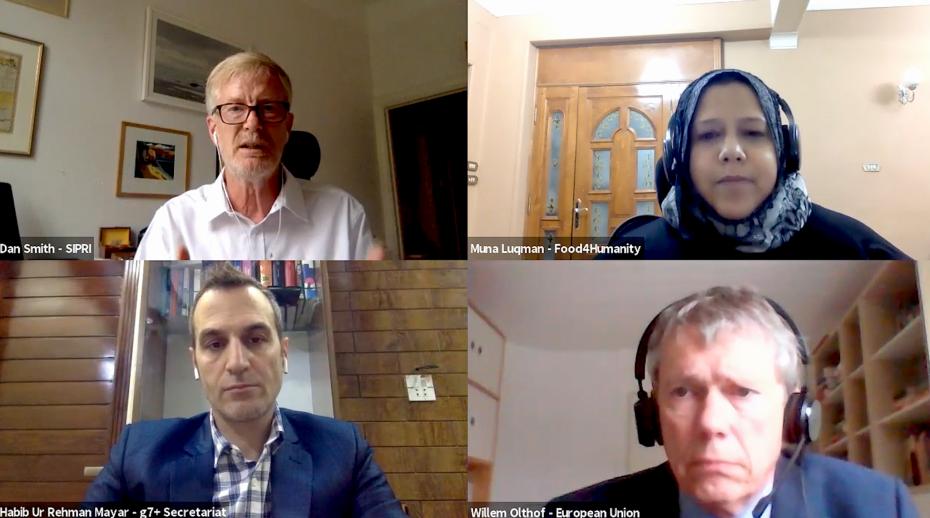UNFSS 2021: Affiliated session From Conflict and Hunger to Stability and Nourishment: A Comprehensive Approach to Peace, Development and Humanitarian Action
Discussion details
 27 July 2021. The webinar 'From Conflict and Hunger to Stability and Nourishment: A Comprehensive Approach to Peace, Development and Humanitarian Action' was an affiliated event of the United Nations Food Systems Pre-Summit and was organized by the Stockholm International Peace Research Institute (SIPRI), the Food and Agriculture Organization (FAO) and the World Food Programme (WFP).
27 July 2021. The webinar 'From Conflict and Hunger to Stability and Nourishment: A Comprehensive Approach to Peace, Development and Humanitarian Action' was an affiliated event of the United Nations Food Systems Pre-Summit and was organized by the Stockholm International Peace Research Institute (SIPRI), the Food and Agriculture Organization (FAO) and the World Food Programme (WFP).
- Moderator: Dan Smith, Director, Stockholm International Peace Research Institute (SIPRI)
- Habib Mayar, Deputy General Secretary, g7+ Secretariat Muna Luqman, Founder and Chair, Food4Humanity Foundation
- Willem Olthof, Deputy Head of Unit, Sustainable Agri-Food Systems and Fisheries, Directorate-General for International Partnerships (INTPA), European Commission
- Rein Paulsen, Director, Office of Emergencies and Resilience, Food and Agriculture Organization (FAO)
- Valerie Guarnieri, Assistant Executive Director, World Food Programme (WFP)
During the event, Mr. Willem Olthof (Deputy Head of Unit INTPA F3), explained the importance of the Global Network against food crises for the European Commission. This global network is meant to be a global public good to help better understand the food crises around the world and in addressing them more successfully. Three elements should be pursued:
- Make sure we continue to base ourselves on the best available information and communicate consistently. This is essential for credibility and avoid duplication of effort. It does not help if different agencies present different numbers of people that need assistance [ref. The Global Report on Food Crises (GRFC) methodology]. This does not mean being stagnant in methodology – improvements are always welcome. But it requires cooperation and triangulation.
- Broadening of support for sustainable investments in fragile contexts. The Food Systems Pre-Summit shows quite clearly that the fragility of food systems is no longer a matter for researchers or specialists in the field, but for all, including at the highest political level. There is a broad common understanding of the need to change paradigm and find solutions to reverse the trends and of putting into practice the principles of economic, social and environmental sustainability for food systems. But the discussions thus far have not been very specific on what areas to focus on. A strong case can and should be built for a focus on fragile areas, particularly for public investments, but also through de-risking of investments by small farmers and SMEs.
- Expand the cooperation between humanitarian, development and peace actors – through joint analysis, information exchange and coordination at different levels. To take just one concrete example, the growing security crisis in the Sahel must be analysed and dealt with in conjunction with the food crisis. The transformation of systems, particularly pastoral systems, requires this integrated approach. Obviously not easy for actors with different backgrounds to cooperate, but essential. Probably the most important way forward is to provide platforms for the actors to come together, learn from each other and build trust.
From the European Commission’s perspective, the Global Network against food crises needs to be further supported to concretise the humanitarian-development-peace nexus approach in the area of food crises, instead of developing new structures.
Log in with your EU Login account to post or comment on the platform.